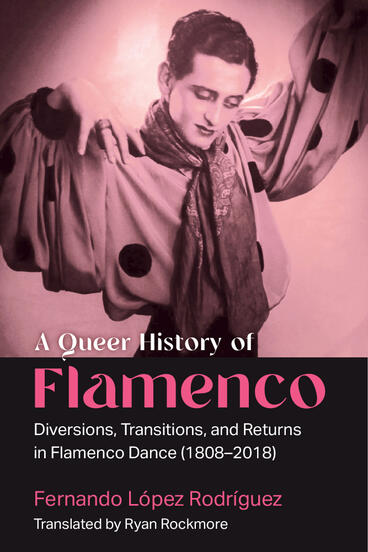A Queer History of Flamenco
Diversions, Transitions, and Returns in Flamenco Dance (1808–2018)
Translated by Ryan Rockmore
Revealing the LGBTQ+ lives of Flamenco artists
Description
A Queer History of Flamenco offers a groundbreaking exploration of flamenco through the lenses of queer theory and cultural studies. Previous histories have provided a largely distorted image about why, where, and how people have done flamenco—as well as who has performed flamenco. Yet feminists, transvestites, butches, femmes, the Spanish Roma, disabled people, guiris, and “incomprehensible” artists have been determined to do things differently without giving up their flamenco status. In this skillful translation of his book Historia Queer del Flamenco, Fernando López Rodríguez draws on diverse archival materials as well as his own lived experience and artistic practice, unearthing queer flamenco histories, voices, and perspectives that were previously unknown, avoided, or purposely hidden.
Tracing flamenco’s development from its birth up to the contemporary era, the book places flamenco within significant historical periods such as the Spanish Civil War, Franco’s dictatorship, the transition to democracy, and the economic crisis of 2008, up to contemporary performances of the late 2010s. In taking a queer approach to History, the author abandons antiquated debates about purities and impurities; anecdotes about the lives of artists that are completely detached from their processes of creation; and myths about geniuses who seem to make art alone and completely detached from their collaborators and the historical, social, economic and artistic moment in which they lived. A Queer History of Flamenco is not only about the present and the queerness of people living, performing, or creating in it, but also about flamenco’s past in which so many queer artists and practices and their lives have remained unearthed and unaddressed.
Fernando López Rodríguez is artist-researcher at Équipe Danse, Université Paris 8-Saint Denis.
Ryan Rockmore is Assistant Dean of Students at Oakwood School in North Hollywood, California and an independent flamenco researcher and performer.
Reviews
“Through an approach anchored in a broad understanding of the term ‘queer,’ López Rodríguez offers a new reading of flamenco dance that highlights forgotten marginal voices from the beginning of the nineteenth century, arguing for the invisibilized queerness flamenco embodies . . . [and for the] life-changing potential of flamenco dance. . . . This book opens the door for new scholarly endeavors within flamencology, serves as a reference for similar intellectual exercises in other dance genres, and engages with current conversations in contemporary Spain that often relegate flamenco to the periphery.”
- Dance Research Journal
“Combines rigorous scholarship on the 200-year history of flamenco to ask innovative questions about how gender performances link to nationalism—including a remarkable focus on theatrical cross-dressing, drag, and the history of male and female prostitution. In addition to its careful attention to gender and drag performance, A Queer History of Flamenco also examines the ‘internationalization’ of flamenco and the form’s relationship with disability. In this sense, ‘queer’ is not simply a synonym for LGBTQ, but rather a method for disrupting expectations and stereotypes regarding this dance form.”
- Lawrence La Fountain-Stokes, University of Michigan
“As the first book-length analysis of queerness in flamenco, this book is incredibly important, not just to flamenco scholars, but to gender and sexuality studies, historiography, sociology, Spanish cultural studies, and performance studies. As both scholar and performer, López Rodríguez brings intellectual rigor and deeply embodied knowledge about flamenco ‘from the inside’ of the art form, excavating previously invisible queer figures in flamenco history, some of them of legendary status.”
- Michelle Heffner Hayes, University of Kansas

